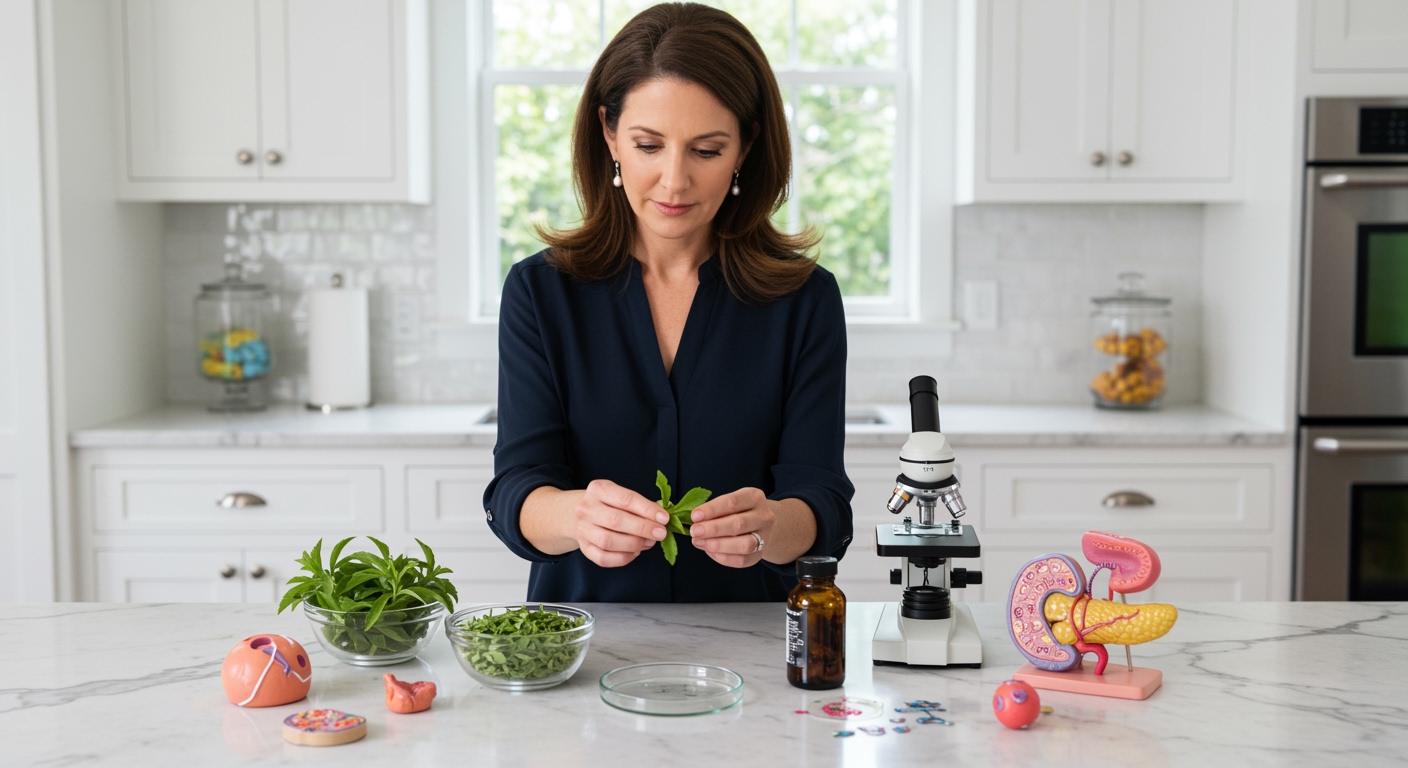✪ Key Highlight: Japanese scientists found fermented stevia creates compounds that kill pancreatic cancer cells while sparing healthy tissue.
Introduction
Your kitchen sweetener might hold the key to fighting one of the deadliest cancers known to medicine.
Japanese researchers discovered that fermented stevia creates powerful compounds that destroy pancreatic cancer cells in laboratory studies while leaving healthy cells mostly unharmed.
Hi, I’m Abdur, your nutrition coach and today I’m going to analyze this groundbreaking research that could transform how we view natural sweeteners in cancer treatment.
What Makes This Discovery So Important?
Pancreatic cancer remains one of the most challenging cancers to treat because symptoms often appear only after the disease has spread throughout the body.
Current treatments like chemotherapy and radiation rarely cure this aggressive cancer, with less than 10 percent of patients surviving five years past diagnosis.
The survival rate is so grim that scientists desperately search for new treatments that are both effective and less toxic than current options.
This research offers hope because the fermented stevia compounds showed selective toxicity, meaning they killed cancer cells while sparing healthy kidney cells in laboratory tests.
Such targeted action is extremely rare in cancer research and represents a significant breakthrough in developing gentler yet effective treatments.
✪ Fact: Many modern cancer drugs like paclitaxel and vincristine originally came from plant compounds.
How Does Fermented Stevia Work Against Cancer?
The Japanese research team used specific kitchen bacteria to ferment stevia leaves, creating entirely new compounds not found in regular stevia sweetener.
During fermentation, these bacteria break down the plant material and produce bioactive compounds that have powerful effects on cancer cells.
The fermented extracts triggered cell death pathways in pancreatic cancer cells, causing them to self-destruct through a process called apoptosis.
Healthy kidney cells remained largely unaffected by the same compounds, suggesting the treatment could avoid the harsh side effects of traditional chemotherapy.
This selective action occurs because cancer cells have different metabolic pathways and vulnerabilities compared to normal cells.
The research was published in Heliyon, a peer-reviewed scientific journal, which adds credibility to these promising findings.
✪ Note: Regular stevia sweetener does not contain these cancer-fighting compounds created during fermentation.
What Does This Mean For Cancer Treatment?
Professor Justin Stebbing from Anglia Ruskin University called this discovery potentially profound, describing it as a stepping stone toward natural, targeted, and cost-effective cancer therapy.
The research represents a shift from synthetic drugs to natural compounds that could be more affordable and accessible worldwide.
However, the scientists caution that laboratory results do not always translate to success in the human body, where biological systems are far more complex.
Much more research is needed, including animal studies and eventually human clinical trials, before fermented stevia could become an actual cancer treatment.
The findings are promising enough to warrant further investigation, especially given the urgent need for better pancreatic cancer treatments.
✪ Pro Tip: Never attempt to self-treat cancer with any natural substance without proper medical supervision.
Should You Change How You Use Stevia?
This research does not mean you should start consuming large amounts of stevia hoping to prevent or treat cancer.
The fermentation process used in the study involves specific bacterial strains and controlled conditions not found in regular stevia consumption.
Regular stevia sweetener, whether in packets or liquid form, has not undergone this special fermentation and does not contain the cancer-fighting compounds identified in the research.
The study serves as a reminder that everyday plants and foods can hold secrets that might one day help save lives with proper scientific investigation.
Continue using stevia as a natural sweetener if you enjoy it, but do not expect it to provide cancer protection in its current form.
✪ Fact: Most research shows artificial sweeteners like aspartame do not cause cancer in humans when consumed normally.
The Bottom Line
This Japanese research opens an exciting door to natural cancer treatments, but we must remain realistic about the long journey from laboratory discovery to actual medicine.
Nature often provides the best medicine, but science must unlock its secrets safely and effectively.
I would love to hear your thoughts about this research and whether you think natural compounds like fermented stevia could revolutionize cancer treatment in the comments below.
References
At NutritionCrown, we use quality and credible sources to ensure our content is accurate and trustworthy. Below are the sources referenced in creating this article:





